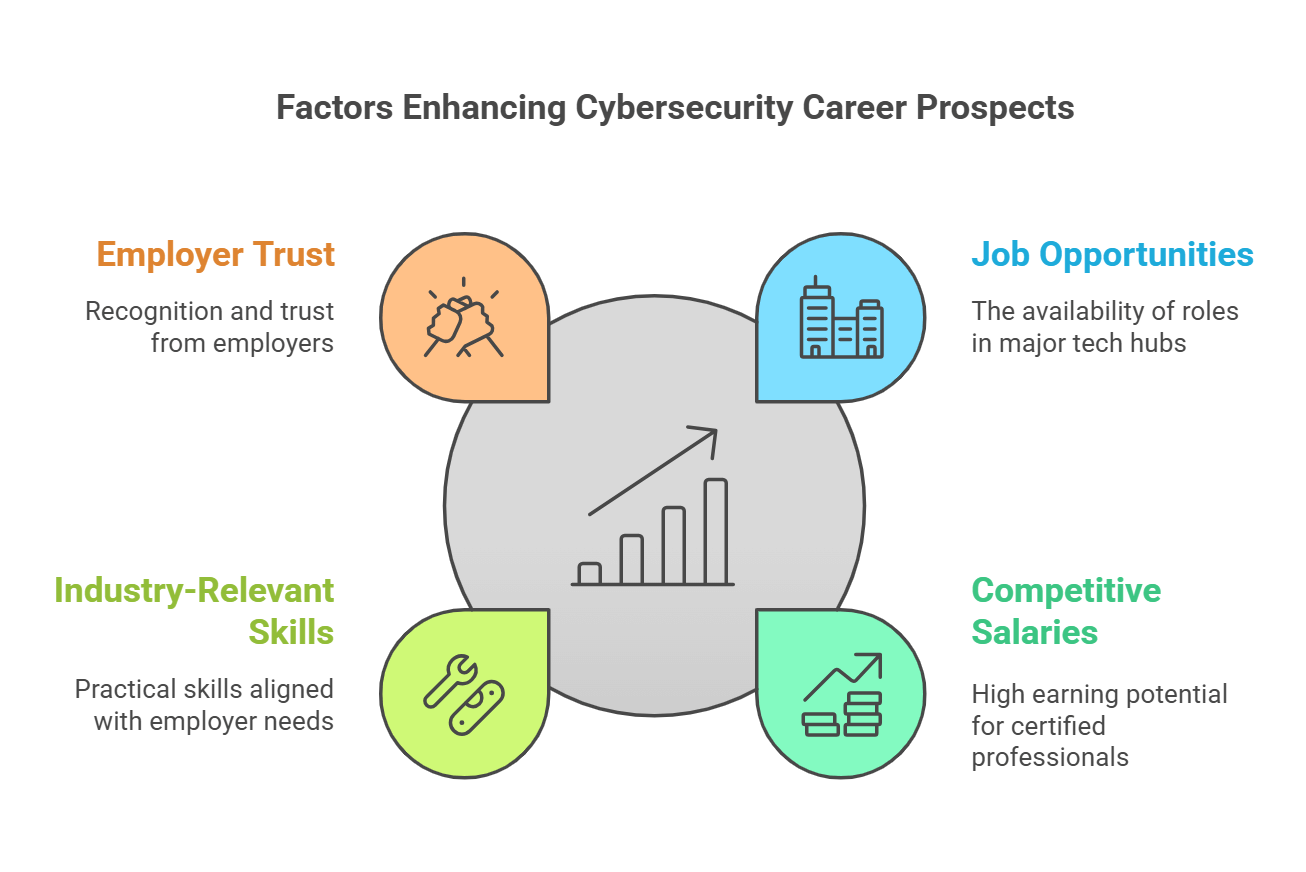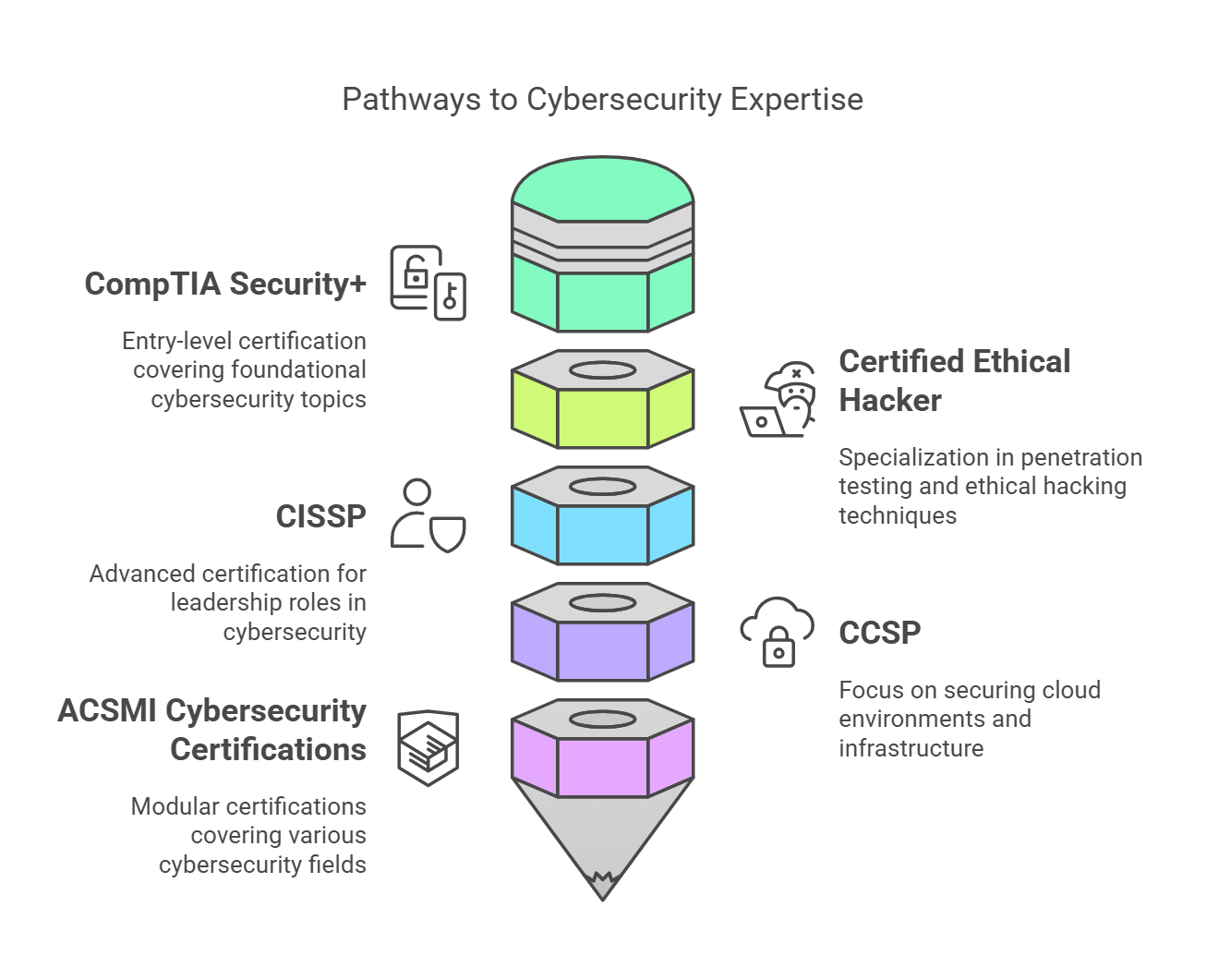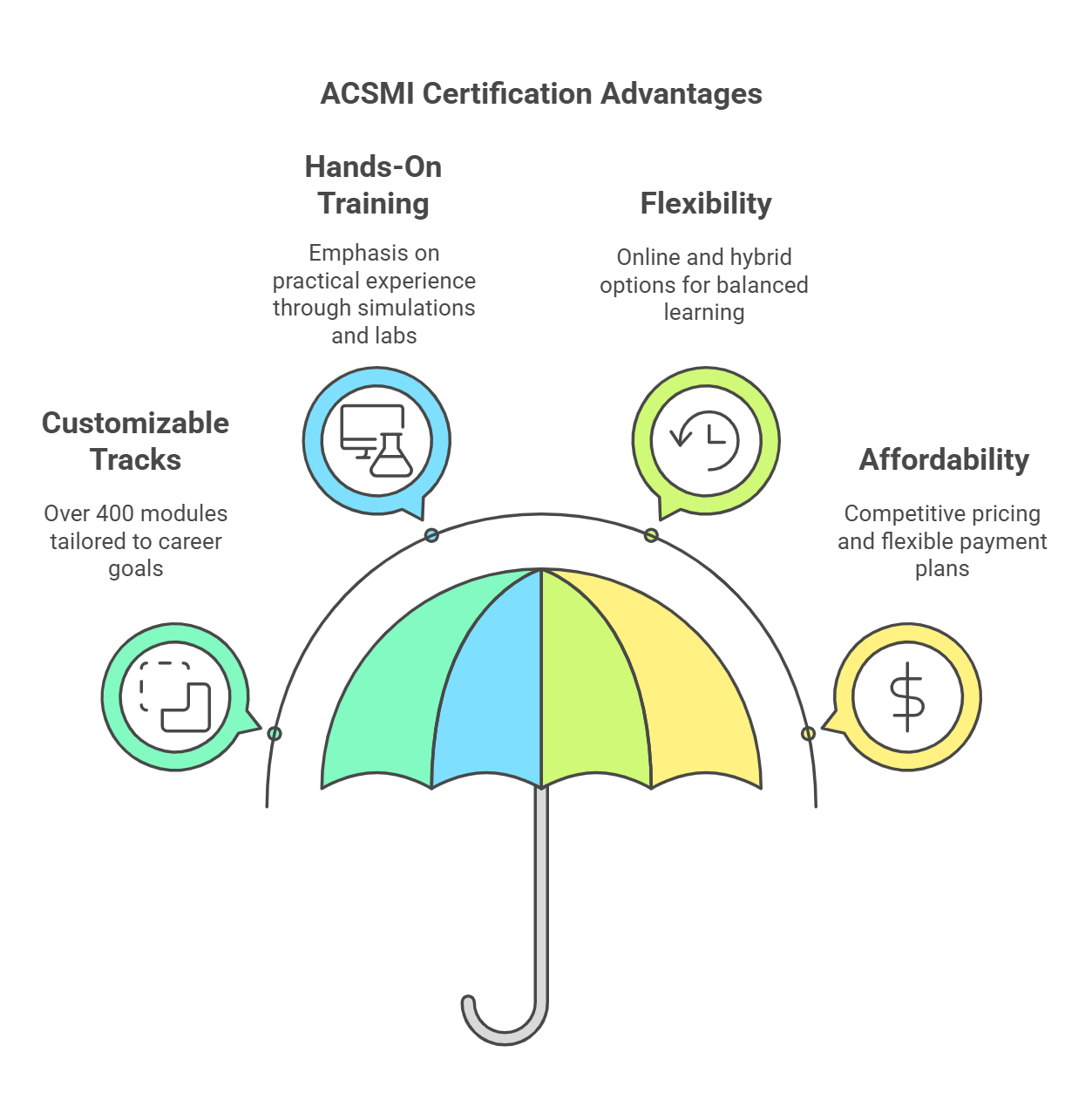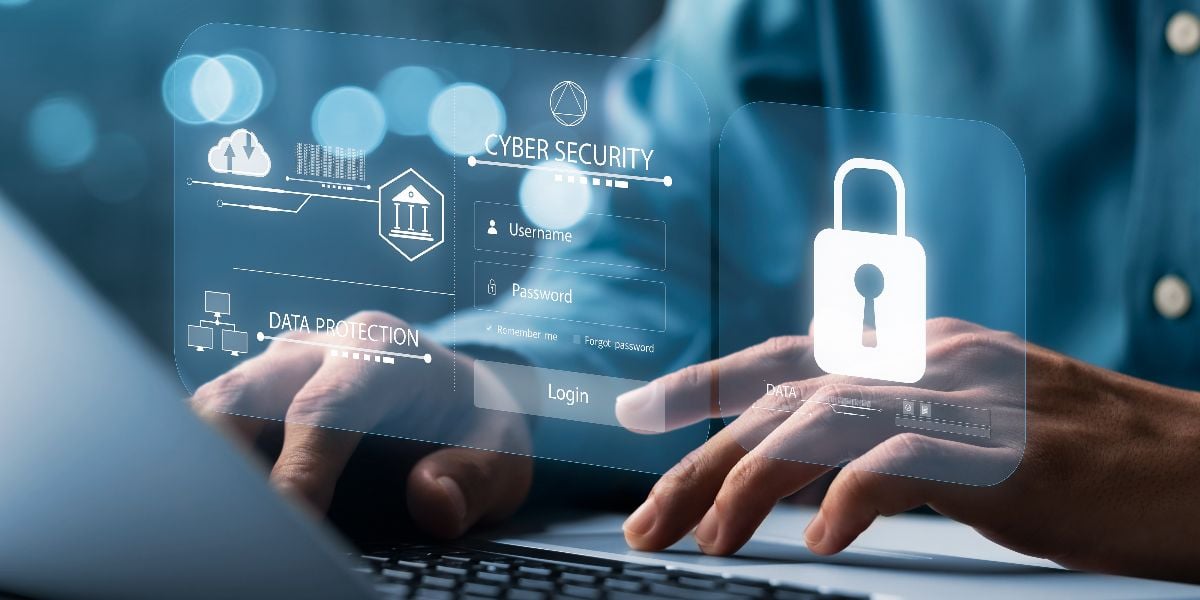Table of Contents
The demand for cybersecurity professionals has never been greater. As digital systems continue to become the backbone of industries from finance to healthcare to government, the frequency and complexity of cyber threats are increasing. This makes cybersecurity professionals crucial for securing digital infrastructures. In this growing field, obtaining a Cybersecurity Certification in the USA can fast-track your career and provide you with in-demand skills. Additionally, Cybersecurity Certification Pay has become increasingly competitive, reflecting the high demand and critical nature of these roles. Whether you’re new to cybersecurity or an IT professional looking to specialize, this blog will guide you through the certification process, the top certifications to pursue, and the benefits of obtaining one.
Why Pursue a Cybersecurity Certification in USA?
Earning a cybersecurity certification in the USA is more than just acquiring a credential. It’s about equipping yourself with technical knowledge, practical skills, and industry-recognized expertise. Here’s why pursuing a cybersecurity certification in the USA is a great investment in 2025:

1. Unparalleled Job Opportunities
The USA boasts some of the world’s largest tech hubs, including Silicon Valley, New York, and Texas. These cities are home to many multinational corporations and government agencies seeking qualified cybersecurity professionals. By obtaining a cybersecurity certification, you open the door to these job opportunities, many of which offer international career prospects. Cybersecurity certifications in the USA meet high global standards, preparing you for top-tier roles in industries like finance, technology, and healthcare.
2. Competitive Salaries
Certified cybersecurity professionals command high salaries. For example, positions such as Cybersecurity Analyst or Information Security Manager in the USA often exceed $100,000 annually, with more experienced roles, such as Chief Information Security Officer (CISO), earning much more. Certification not only boosts your employability but also ensures you receive a competitive salary in a fast-growing industry.
3. Industry-Relevant Skillsets
Cybersecurity certifications, especially those offered by reputable institutions like ACSMI, are designed to equip professionals with the skills employers are actively looking for. These certifications focus on practical expertise and up-to-date knowledge, ensuring you are industry-ready right after completing your training. You’ll gain the ability to manage real-world cybersecurity challenges, enhancing your chances of securing high-level roles.
4. Earning Employer Trust
Companies increasingly prioritize candidates with professional certifications because they demonstrate in-depth knowledge and a strong commitment to cybersecurity. Certifications like CEH (Certified Ethical Hacker), CISSP (Certified Information Systems Security Professional), or ACSMI’s specialized programs signal to employers that you have the necessary skills to manage complex cybersecurity challenges. These credentials enhance your marketability and make you stand out from other job candidates.
Types of Cybersecurity Certification in USA
Choosing the right certification depends on your career goals and current skill level. Below are some of the most recognized certifications in the USA, each catering to different stages in your cybersecurity career:

1. CompTIA Security+
CompTIA Security+ is an excellent entry-level certification for those new to cybersecurity or IT professionals transitioning into the field. This certification covers essential topics like network security, operational security, and risk management, providing you with the foundational knowledge necessary for any cybersecurity role.
2. Certified Ethical Hacker (CEH)
Ideal for those looking to specialize in penetration testing, CEH focuses on understanding vulnerabilities in computer systems and equips you with ethical hacking techniques to prevent cyberattacks. This certification is ideal for professionals interested in offensive security and testing the strength of their systems’ defenses.
3. Certified Information Systems Security Professional (CISSP)
CISSP is an advanced-level certification tailored to seasoned cybersecurity professionals. It covers a range of critical topics such as risk management, software development security, and cryptography. CISSP is perfect for those looking to take leadership roles in cybersecurity, such as IT security managers or directors.
4. Certified Cloud Security Professional (CCSP)
As more businesses move to cloud environments, the need for cloud security expertise is growing rapidly. The CCSP certification ensures that professionals are equipped with the knowledge and skills to secure data and systems on cloud platforms. This certification is essential for those working with cloud infrastructure or in cloud security roles.
5. ACSMI Cybersecurity Certifications
ACSMI offers an extensive range of certifications, including over 400 modules designed for flexibility. These certifications allow you to specialize in various cybersecurity fields such as IoT Security, Advanced Threat Analysis, and Risk and Compliance. ACSMI’s modular approach gives you the ability to tailor your learning path to match your career goals and industry needs.
How to Get Cybersecurity Certification in USA
Earning a cybersecurity certification requires careful planning and execution. Here are the major steps you’ll need to follow:
Step 1: Define Your Career Goals
Decide whether you want to specialize in areas like ethical hacking, risk management, or cloud security. Understanding your career aspirations will help you choose the right certification that aligns with your goals.
Step 2: Research and Choose a Program
Look for industry-recognized programs, such as CISSP for advanced professionals or introductory ACSMI modules for beginners. Ensure the program is accredited and meets the current needs of the cybersecurity industry.
Step 3: Enroll in a Program
Many US-based institutions and online platforms offer flexible enrollment options. Programs like those offered by ACSMI provide practical, hands-on training, which is critical for understanding real-world cybersecurity threats.
Step 4: Study and Get Hands-On Practice
Cybersecurity requires practical application. Engage in online labs, employer-driven projects, and real-life attack simulations to build your skills. The more hands-on experience you gain, the better prepared you’ll be to handle complex security challenges.
Step 5: Take and Pass the Exam
To complete your certification, you will need to pass an exam. Certifications like CompTIA and CEH require successful completion of exams administered by certified testing centers in the USA or through online platforms.
Benefits of ACSMI Certification
ACSMI’s modular cybersecurity certification programs stand out due to their flexibility, affordability, and practical learning approach. Here’s why ACSMI is an excellent choice for professionals seeking certification in the USA, especially for those curious about the Cybersecurity Certification Salary and the potential financial rewards in this growing field.

Customizable Tracks
ACSMI offers over 400 modules tailored to your specific career goals. Whether you’re interested in cloud security, IoT security, or risk analysis, ACSMI provides a certification pathway that’s aligned with your aspirations.
Hands-On Training
Unlike traditional certifications, ACSMI emphasizes hands-on training through simulations, interactive labs, and field-specific case studies. This practical experience is crucial for understanding real-world cybersecurity challenges and applying your knowledge.
Flexibility
ACSMI offers online and hybrid learning options, making it possible for working professionals or students with other commitments to earn a certification at their own pace. Flexible learning options help you balance your education with your career or personal life.
Affordability
ACSMI offers competitive pricing for its certifications, along with flexible payment plans to ensure that cost doesn’t become a barrier to your career advancement. These affordable options make ACSMI certifications accessible to a broader audience.
Final Thoughts
The demand for cybersecurity professionals is growing rapidly, making a Cybersecurity Certification in the USA a valuable investment. By pursuing certifications from globally recognized institutions like ACSMI, you’ll gain the skills and expertise needed to thrive in this critical industry. Whether you are starting your career or looking to advance, cybersecurity certifications will set you on a path to success in 2025 and beyond.
FAQs
What is the cost of cybersecurity certification in the USA?
Certification costs vary by program. Entry-level certifications like CompTIA Security+ typically range from $300 to $500, while more advanced certifications like CISSP can exceed $1,000. ACSMI offers affordable, flexible pricing.
How long does it take to complete a cybersecurity certification?
The duration depends on the program. Introductory certifications like Security+ can be completed in weeks, while more advanced certifications such as ACSMI modules or CISSP may take several months.
Are cybersecurity certifications in the USA recognized internationally?
Yes, certifications like CEH, CISSP, and ACSMI’s programs are globally recognized and highly valued across industries, making them a great asset if you wish to work internationally.
What entry-level certifications should I consider in the USA?
CompTIA Security+ and ACSMI’s foundational modules are excellent entry points for beginners. They provide solid foundational knowledge necessary to pursue a career in cybersecurity.
How often do certifications require renewal?
Most certifications require renewal every three years to ensure your skills stay current with the ever-evolving cybersecurity landscape.
Can I pursue cybersecurity certifications while working full-time?
Yes! Many programs, including ACSMI, are designed with working professionals in mind, offering online and self-paced learning options.
Is cybersecurity certification enough to start a career in the USA?
While certifications are essential for getting started in cybersecurity, hands-on experience through internships, projects, or practical labs will significantly boost your chances of landing a job.

Leave a Reply